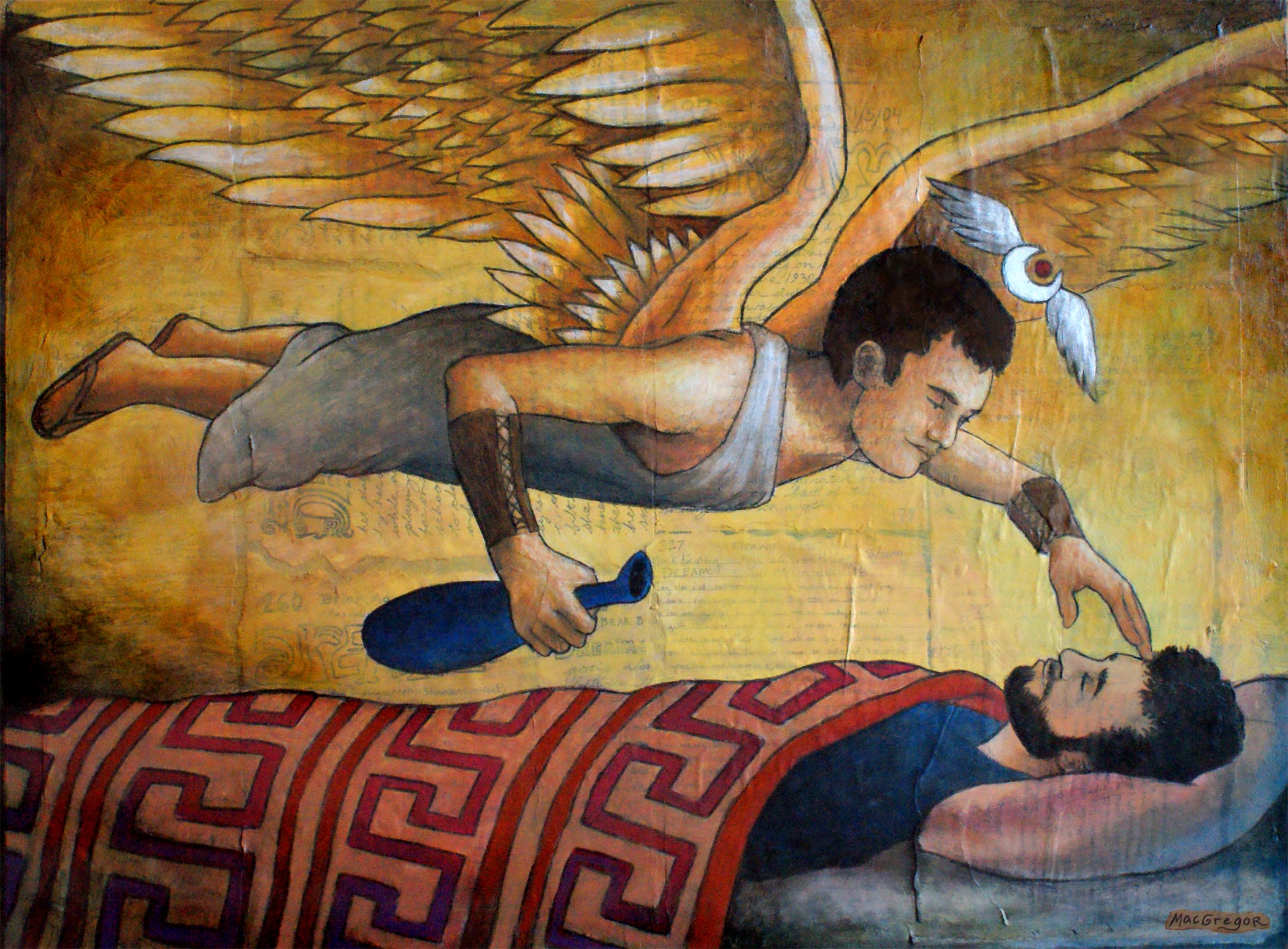June 24, 2009 at 9:31 pm
· Filed under Business of psychotherapy, Experiences & Musings, Information & Referrals, Spiritual Counseling Theory
Pagan Centered Podcast (PCP) episode #108 is now online. As I discussed in earlier posts here and here, we discuss several topics related to therapy and Paganism for a bit over an hour. It’s been online for 3 days and already has 424 downloads — I’m psyched! (Bad pun intended.)
Amber and Dave at PCP also posted a nice outline of the show online so that if you are interested in a specific topic you can jump right to the portion of the show that it’s discussed.
The outline of the show is here.
The actual .mp3 file is available for download here.
This show is also available through iTunes.
Permalink
June 24, 2009 at 9:04 pm
· Filed under Uncategorized
Brian has completed the black and white work of the painting. His note says:
“Here is how it looks so far in the black and white stage…. I am going to work on the colors soon. This took me all week to get to this point. I included references from three different books on dreams and Hypnosis and the uses of it and its origins. Also a chart of the sleep stages, and dreams. I got to say I am loving this idea and making it museum worthy.”

Permalink
June 20, 2009 at 2:01 pm
· Filed under Uncategorized
The Association for Spiritual, Ethical, and Religious Values in Counseling (ASERVIC) has revised its list of counselor competencies for dealing with spiritual subject matter. I mentioned this association (which I belong to) in my recent PCP podcast on finding a Pagan-friendly counselor (episode #108 — not available quite yet as of today).
Items #7 & #8 give me hope that counselors will show increasing tolerance for Paganism:
- 7. The professional counselor responds to client communications about spirituality and/or religion with acceptance and sensitivity.
- 8. The professional counselor uses spiritual and/or religious concepts that are consistent with the client’s spiritual and/or religious perspectives and that are acceptable to the client.
Item #10 may give some clients pause — a counselor following this would explicitly inquire about the client’s religious and spiritual perspectives. Pagan clients will need to have an answer they are comfortable with ready to go:
- 10. During the intake and assessment processes, the professional counselor strives to understand a client’s spiritual and/or religious perspective by gathering information from the client and/or other sources.
What I would like to see more of in this standard is an emphasis on actively finding the positive tools, techniques, and outlooks included in religions that help clients towards health. So the standard does say that counselors recognize that religious perspectives can effect mental health positively and negatively, and that the counselor can use religious practices when appropriate, but the standard does not emphasize trying to actively seek out the tools within each religion that promote health.
— Michael
Permalink
June 14, 2009 at 3:09 pm
· Filed under Experiences & Musings, Got My Geek On!, Information & Referrals
Brian is continuing work on a painting of Hypnos for me, as I reported on in an earlier segment. He seems very excited by the progress and so am I.
Here are pictures of a study version of the painting, and the initial drawing on wood for the final painting. Click on the picture to see the larger version:
Permalink
June 14, 2009 at 2:51 pm
· Filed under Experiences & Musings, Spiritual Counseling Theory
I got to visit the grand re-opening of a drop-in center on Friday. A drop-in center (sort of like the name implies) is a facility, usually run by other mental health clients, for the benefit of mental health consumers. They play games, watch movies, generally hang out, and frequently get involved in educational and job-related activities as well.
Anyway, I walked into this drop-in center and shortly noticed 4-5 clients all wearing pentacles, dragons, tattoos, and all the usual status stuff that marks Pagans as Pagans.
This was interesting as I don’t generally encounter lots of Pagans in the more serious mental health settings. (While not always true, people who choose to hang out with other mental health clients on their free time are often among the more seriously mentally ill.)
Well, apparently several of these Pagan folk attend the psychiatric rehab program (PRP) across town (ironically they don’t attend mine — where the management is Pagan). Pretty soon I was hearing stories of astral battles, shamanic banishment of astral nasties, and the ways in which their PRP was now cleansed, warded, and protected courtesy of the Pagan clients.
All in all a rather normal Pagan conversation. Except for the setting.
Which put me in both a state of cognitive dissonance and a thoughtful mood.
Cognitive dissonance because half of me approved and the other half of me was evaluating for possible delusions. Thoughtful because of all the ideas and questions that came to me. A sampling:
- How exactly would the typical psychiatric center staff react if they caught a banishment ritual going on? How should they react? Do they dare even consider allowing it?
- In a traditional culture (or a Pagan discussion environment) this problem would not even arise. The shaman (or Pagan) would of course be allowed to proceed with the banishment. It would not matter if he/she was really banishing nasties or just hallucinating it — the community support would make it no big deal and possibly be healing to the individual.
- But in a serious mental health center, when do you let clients run free with their paranormal experiences — especially if they are involving other clients?
- Hmmm… maybe I should ward and cleanse my PRP better too…
I’m intrigued how this all fits together. I suspect these Pagan folks just quietly do their thing, with the psychiatric staff none the wiser. Perhaps the staff overlook a certain amount of odd behavior. I think there would need to be a treatment team ethic in place something to the effect that its healthy to allow clients to work through their own delusions if no one is being hurt. (And of course, maybe its not delusion and the center is the safer for it…)
I’d be real curious to know how this balancing act plays out at their PRP — but of course if I ask I might upset the apple cart.
Permalink
June 12, 2009 at 11:50 am
· Filed under Business of psychotherapy, Information & Referrals, Spiritual Counseling Theory
Wednesday I got to hear an advance copy of my interview with PCP: Pagan-Centered Podcast. I was very happy with it, apart from some sound quality issues. They did a good job cleaning up my “ummm..” and awkward pauses.
Self-promotion aside, I think this is a worthwhile interview to listen to if you are hesitant to see a therapist and want to know how to approach a therapist with Pagan beliefs. I also cleared up misconceptions on being involuntarily hospitalized, drugged without consent, labeled schizophrenic for paranormal experiences, and a host of other concerns. I was quite happy with it.
I believe it will be posted as episode #108 in a few weeks. You can get it off of iTunes, or visit their website for other methods.
Permalink
June 1, 2009 at 4:53 pm
· Filed under Events
Yesterday I completed about a 2 hour interview with Amber and Dave at the Pagan Centered Podcast (PCP) — a show that tells it how it is on a wide variety of topics.  I was thrilled to be able to talk about one of my favorite topics — Paganism and psychotherapy.  I believe the show is slated to be #108 or so in their line-up 3+ weeks from now. I doubt it will be 2 hours after editing.
We covered a variety of interesting topics — which I won’t talk about much right now because that would ruin the anticipation, wouldn’t it? A few topics we discussed:
- Is it hard for a Pagan to find a good therapist?
- What are the criteria for selecting a good therapist? What additional criteria might a Pagan look for?
- Do patients claiming experience strong paranormal gifts always get prescribed psych meds?
- Can a patient claiming to be Otherkin (the idea of having a soul that is either partially or completely non-human in some way) be in a healthy mental state?
- What are some guidelines a new Pagan patient should follow when going to see a therapist?
I think I came through halfway coherent and without babbling too much (we’ll see). I will say that I gave some ways to find therapists who might be more understanding of Pagan clients. I also emphasized that HEALTH is what matters — not a client’s belief system.
You can download their podcasts from iTunes. Their website is at http://www.pagancenteredpodcast.com
— Michael
Permalink


